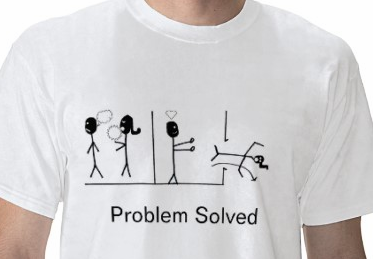You’re fair, reasonable and pretty good at what you do, right? You probably even enjoy it sometimes.
So what’s wrong with other people?
Why is that clients or bosses sometimes seem so clueless about what’s actually involved in getting things done well? Conversely, why is that freelancers or employees sometimes need so much oversight to do things that aren’t that hard?
Here’s a hint: Whether you are outsourcing or overseeing, freelancing or employed, before work begins, you talk about what the work will be, right? But then when a work process goes badly, it’s often not the work, it’s the other person that causes the most frustrating problems, isn’t it?
So, here’s the solution: Uncover the strange expectations and unexpected rules that other people always seem to have before you start the work. Learn about the person first, the work second. To do that, you need a question-asking process.
 You won’t know if you don’t ask.
You won’t know if you don’t ask.
Let’s say you’re designing a logo. You might ask:
- Good: “What will you be providing and what do you expect me to provide?”
- Better: Be specific based on your experience. “Did you have a color scheme in mind?” “Is there something you already like that we’ll be comparing this to?” Etc.
Before beginning work of course you’ll talk about payment, deadlines and related expectations. But there are issues worth touching on, too:
- Good: Is there anyone else I should be in touch with?
- Better: Will you be helping your boss/spouse/partner follow along as we proceed?
Example of what could have been famous last words that were instead uncovered before work began:
Good thing I asked before work began:
- “After you’re all finished my wife will tell me if what you’ve done is any good.” Instead, we got her involved up front so that only “good” work was done.
Made me look good to the hidden decision maker:
- “Yes, I’ll be in touch with my boss. I have to provide a status report to her at the end of every month.” I got them to send me the form showing everything that went into the status report, and then added the reporting dates to my process so that everything they needed would be available—and so that everything that went into the report reflected favorably on my work.
Don’t just ask questions, have a short and simple process:
All you really need to know to do this well is to ask more “How?” questions, such as “How is it that things should be done?”
“How?” questions help reveal personal rules that can cause surprises later if you don’t know about them. Sounds simple enough, right? But there’s one big illusion that keeps people from asking enough of the right questions:
Don’t be agreeable…if it means being superficial.
 Why is communication often superficial?
Why is communication often superficial?
Because it’s easier. It feels friendlier. It’s our default state. And you have to break through that, because you need to learn the expectations and baggage the other person has that is going to affect you later.
You have to be willing to suffer a little frustration, because you must do your digging before work begins.
Here’s a timeline of how taking extra time to communicate first goes:
- Begin: Frustration. Why are they communicating so much? They really seem a little over-obsessive about things.
- During: Relief. This is actually going very well. They asked a lot of good questions and really seem to understand what’s needed for this to go well.
- End: Enthusiasm. At first, I was concerned, but this is one of the best experiences I’ve had!
Here’s a timeline of how many jobs go:
- Begin: Enthusiasm. “I’m so glad to find someone who does this kind of work!” — “I love doing this kind of work!”
- During:Â Frustration.
- End:Â Relief.
Be honest: Which do you think is the better way to go?
How to make future jobs go much better:
- Print the numbered list below.
- Find the one step that would bring the MOST improvement to your process.
- Do it! Change how you work. Experiment.
- Ignore the other steps for now.
- Repeat: Review this list in the future to pick the next step that would bring the MOST improvement to your process.
For most people, more phone calls will cause huge improvements in communication and process. They can be very short calls, people!
1. Don’t just collect biases. Gain experience (and wisdom).
- Common: You quit working with someone because they lie, and can’t silence that nagging voice that now says “Be sure not to work with another liar!”
- Uncommon: You read and think about what a good client or hiring process should be like so you will choose better people in the future.
2. Quit discussing work. Discuss process first, before discussing work.
- Common: People sometimes seem to behave unreasonably, or act confused about things that were already made clear.
- Uncommon: You are as comfortable working with new people as with people you have worked with for years, because both understand your process before there is any actual communication about doing work.
 3. Never make exceptions to your process!!
3. Never make exceptions to your process!!
- Common: Working with others is fun and easy at first, but becomes stressful later in a project. And you seem to end up with unreasonable deadlines or change requests more often than you would like.
- Uncommon: You easily identify people who will be difficult to work with right away, and it gets easier and easier with everyone else, even as work gets more and more demanding.
Remember, people will always push to do things superficially. They don’t know the benefits of following your process. It just looks like delay or something they don’t want to do. But you must make them do it. And the easiest way to do this is if you started talking about process before your started talking about work. Be proactive.
4. Repeatedly meet by phone or face-to-face when there is an issue.
- Common: Email exchanges sometimes become confusing, or people seem terse, overbearing or a bit clueless in some emails. Emails are sometimes overlooked or misunderstood.
- Uncommon: You’ve explained that check-in phone calls are a required, non-optional part of your process, and they keep things going smoothly.
Call as soon as you have a question or concern. And don’t give large projects to people you can’t call or meet with. Give them test projects only. Be biased in favor of people you can talk to. I have always been able to find an overlapping time to talk regardless of time zone differences.
5. Decide who will manage which parts of the process, but manage the overall process yourself.
- Common: Unclear information causes work to be done incorrectly, or not to be done. Questions like these come up frequently:
- Why didn’t the freelancer wait until the colors were provided before starting on the logo? Why didn’t the client tell me they were going to provide colors I was supposed to base the logo on?
- Why didn’t the client tell me they wanted to be involved in the research before letting me begin writing? Why didn’t the freelancer first talk to me about the research sources they were going to use before starting to write?
- How to do they expect this to move forward if they don’t provide “x?”
- Uncommon: Extra questions are asked to bring out things that might have been overlooked or not considered fully enough. A written outline describes not only who will do what, but also the agenda for discussions at different parts of the process.
 Postscript: Email is bad for learning about someone
Postscript: Email is bad for learning about someone
Email is great for summarizing, sharing resources, documenting, some brief communications and a few other things. But it’s very hard to do what is so simple in verbal communication: pick up cues and adjust communication before you speak. Texting is a little better, but because it’s not real time like verbal communication, it’s a poor substitute also. Learn about people by talking to them.
For example, in verbal communication, you can often tie tangents and related topics back to priorities smoothly in real-time without confusion:
- You: “Do A and this shouldn’t take long”
- Them: “Did you mean do B? I think B is what you might actually mean.”
- You: “No, do A. B is not quite the same thing.”
- Them: “That’s true. But doing B has these advantages…”
- You: “I see what you mean. But doing A has these advantages…”
- Them: “That’s all true, but did you notice B will save time overall?”
- You: “You’re right, B is better. They’re more different than you realized, but I agree with you: B is the way to go”
By contrast, in email things can get confusing fast:
- You: “Do A so we can get this done by tomorrow.”
- Them: “B will do the same thing A will do for you because of C. I’ll start on B right away.”
- You: “Wait, don’t do B! Do A. C doesn’t apply because of D.”
- Them: “A and B are really the same thing. It will be easier if I do B, as I already explained.”
- Them: “Did you see the email I sent you about C?”
- Them: “I don’t understand what you mean by D. What does that have to with A?”
- Them: “I haven’t heard back from you so I’ll catch up with you tomorrow.”
The project is now delayed, and there are several “threads” you could respond to them about:
- A new schedule, because email confusion caused a delay.
- That you got their email about C
- What you meant by D
- Ensure they understand how A and B are not the same
- …or just say “Do A and we’ll talk about it later!”
…and you would have missed the time-saving opportunity that B represented. If you had just talked over the phone, there would just be one topic: “A or B?”  …and it would have been easily cleared up.
Thanks for reading!
